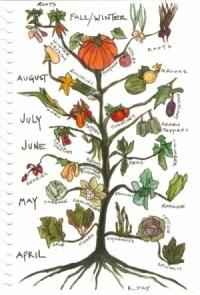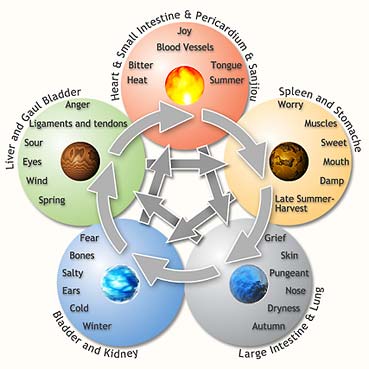Eating Seasonally: Why it matters
Published on November 9, 2014 by Dr. Caitlin Gordon
 Eating with the seasons always seemed like a challenge to me. I had to research what foods were in season each month in my state of Colorado, then make a list and take it to the grocery store, and then read signs to make sure I was choosing the stuff produced locally. Often, I couldn’t find some of what I was looking for from local sources at the major grocery stores. It doesn’t sound like a lot of work, but it was a couple steps I inevitably failed to do.
Eating with the seasons always seemed like a challenge to me. I had to research what foods were in season each month in my state of Colorado, then make a list and take it to the grocery store, and then read signs to make sure I was choosing the stuff produced locally. Often, I couldn’t find some of what I was looking for from local sources at the major grocery stores. It doesn’t sound like a lot of work, but it was a couple steps I inevitably failed to do.
Signing up for a local farmshare (you pay a set amount and get a share each week or every other week of whatever is harvested at the farm) took all the guesswork out of eating seasonally. Instead of going to the grocery where everything is available, but half of it (or more) has been shipped from Chile, Mexico or the East coast, I just went to the farm and got my bags of fresh produce each week. Buying your produce from the farmer’s market is another great way to eat seasonally.
But why care in the first place?
1. You are getting fresh produce.
Fresh produce simply tastes better. When you buy vegetables and fruit that have been sitting in a shipping container for 2 weeks, it just won’t taste as good. The chilling process leaches flavor. Fresh food makes a big difference in cooking. All your recipes will turn out superior with fresh ingredients. You may be inspired to increase the variety of produce you eat. By trying what is in season, instead of what you like, you will expand your palate and come up with fun new recipes. My farmshare forced me to find a way to use large quantities of radish, parsnip, and fava beans which are foods I wouldn’t have otherwise purchased.
2. Your produce is consumed at its most nutritious point.
Did you know that the nutrients in your produce diminish drastically after being picked? This means that strawberries from South America that you buy in the grocery store in the winter, may be 2 weeks old already. They have lost the vast majority of their nutritional value (antioxidants, minerals, and vitamins). Compare a tomato in January (Coloradans) to a tomato in August–your taste buds know which one is more nutritious. Irradiation and preservatives like wax coating on apples are also unfortunate downsides to the shipping process and have negative health consequences.
3. You are supporting your local economy.
Supporting local businesses is a great way to positively contribute to your community. It helps create jobs and maintain a higher standard of living. It also connects you to your community and the environment when you link your eating habits to the changing weather. Being part of a CSA group or attending the farmer’s market is a wonderful way to make new friends, network for your business, and bond with your neighbors.
4. You are reducing your carbon footprint.
Consuming produce that has been shipped thousands of miles is not environmentally friendly. There is a high carbon footprint due to the transportation costs of consuming fresh produce that is out-of-season. We are privileged that we have the option of eating almost anything we want at any time of year, but this is an unsustainable practice. Do your part to reduce your carbon footprint by eating seasonally. Your grandchildren will thank you!
5. You are saving money.
When you buy what’s in season, you buy food that’s at the peak of its supply and costs less to farmers and distribution companies to harvest and get to your local grocery store shelves. Foods that travel a long distance accumulate costs (nutritionally and economically) which are transferred to you, the consumer. If you really want some out-of-season produce, go for frozen. It will be more cost-effective and is likely to have been frozen closer to its nutritional peak.
Chinese Nutritional Therapy
 Eating seasonally makes sense for your body. In Traditional Chinese Medicine (TCM), everything focuses on maintaining balance. In cold months, you want to eat spicy, warm foods. In hot months: cooling, raw foods. This is how nature intended it! If you eat what is in season, you will naturally be eating the right foods to keep your system in balance.
Eating seasonally makes sense for your body. In Traditional Chinese Medicine (TCM), everything focuses on maintaining balance. In cold months, you want to eat spicy, warm foods. In hot months: cooling, raw foods. This is how nature intended it! If you eat what is in season, you will naturally be eating the right foods to keep your system in balance.
In the summer, there are more fresh fruit and vegetable options and juices and smoothies are in order. Raw fruit and vegetables like cucumbers are ripe in the summer and cooling; they help keep you in homeostasis during hot weather.
In the winter, root veggies, dried herbs and spices, and dry goods like grains are available if you are eating seasonal options and no foods that have been shipped from another climate. Turns out root vegetable and dried herbs are warming and support kidney function—two things that help keep your body healthy in the winter. You can find mango and pineapple all winter long in the grocery store, but these foods don’t make sense to be eating in cold weather from the perspective of Chinese medicine and the 5 elements. These foods are cold in nature and sweet. They work on the earth element, which is the element associated with harvest time and late summer. Eating too many raw tropical fruits in the wintertime will throw your system out of balance. It is possible you will experience a weakened immune system, lowered ability to stay warm, weight gain, congestion or sinus drainage, trouble focusing, feeling groggy in the mornings, and moodiness.
- Want to start eating seasonally? Find out what is in season near you!
- Read The Omnivore’s Dilemma for more information on eating seasonally.
The contents of this site, including text, graphics, images, and other material are for informational purposes only. Nothing contained in this site is or should be considered or used as a substitute for professional medical or mental health advice, diagnosis, or treatment. Please schedule an appointment for personalized health advice.






